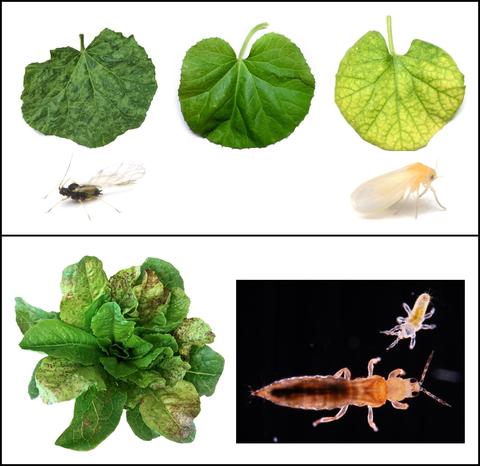The California Department of Pesticide Regulation has awarded grants to two UCR scientists, Kerry Mauck and Chow-Yang Lee, for innovative research projects to reduce overreliance on pesticides.
Excessive pesticide use causes widespread environmental contamination. It can be toxic to other living things, including beneficial insects, wildlife and humans. More than 90 percent of water and fish samples in river basins and urban streams across the country have been found to contain pesticide samples.
To help prevent such outcomes, the department is funding four scientists and their teams working on ways to control pesky insect infestations without using pesticides as a first line of defense. They are instead using what is known as integrated pest management strategies, which emphasize monitoring, trapping, and other means to combat destructive bugs and germs.

Professor of Entomology
Mauck, an assistant professor of entomology, is receiving $217,000 to explore “plant immunity priming” in lettuce and melons. This technique would stimulate plants’ natural defenses against damaging viruses, reducing the need for pesticides to kill the insects that spread diseases and bolstering the production of these crops.
“Plant viruses persist in insect vectors, weeds, and other crops, so lettuce and melons are likely to be exposed to viruses coming from these sources,” Mauck said. “Priming activates anti-viral defenses before virus exposure, giving the plant a fighting chance to grow and produce a usable crop even under strong virus pressure.”
The Mauck laboratory is particularly interested in studying how pathogens spread by insects evolve to alter the physical traits of their hosts in ways that enhance transmission, as well as strategies for disrupting these interactions. They also study mechanisms underlying the emergence of new pathogens as crop pests.
Lee, a professor and the Endowed Presidential Chair in urban entomology, is receiving $111,000 to research the use of sucralose — a common artificial sweetener — in baits to eliminate the German cockroach, a major indoor public health insect pest in the United States.

Presidential Chair in Urban Entomology
The negative consequences of a German cockroach infestation include transmission of pathogenic microorganisms, respiratory illness such as allergy and asthma, and hygiene issues. Over-reliance and frequent usage of insecticides have led to the development of insecticide resistance in the German cockroach, and accumulation of pesticides in the indoor environment that could seriously impact human health. If successful, sucralose could provide a safe, low-cost way to control common urban pests.
“Artificial sweeteners are sweet-tasting additives found in beverages, food, drugs, and other products. They are often marketed as healthy alternatives to naturally occurring sugars due to their lower caloric values and dental health benefits,” Lee said. “However, ingestion of sweeteners by insects such as the German cockroach can lead to significant deleterious physiological effects.”
Plant pathologist Johanna Del Castillo Munera of UC Davis and horticulturist Zheng Wang of UC Agriculture and Natural Resources also received awards.
“DPR’s Research Grants and the work they fund are vital to our mission to protect human health and the environment,” said department Director Val Dolcini. “This money will fund cutting-edge research by some of the state’s top scientists specializing in pest management.”
